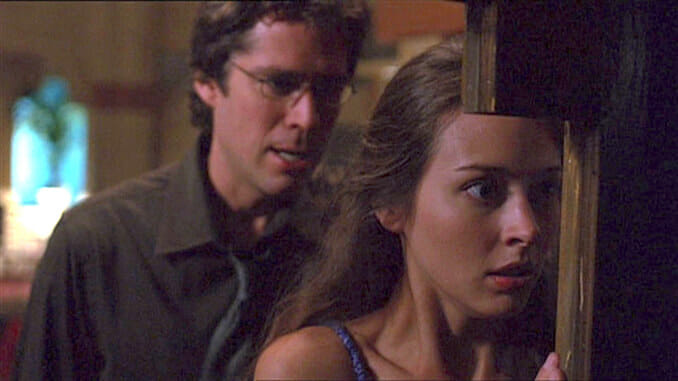On “Billy,” The Buffyverse’s Most Terrifying Episode, and the Horror of Violent Misogyny
Photo Courtesy of 20th Century Television
For all the prestige that Buffy the Vampire Slayer enjoys for being the most iconic, influential, and well-written television shows of the ‘90s (nay, all time?) the show’s spinoff, Angel spent its 5-season runtime living mostly in Buffy’s shadow. While for many it may perpetually exist as an afterthought for another series, Angel had some truly great episodes in its own right, including Season 3’s skin-crawling “Billy”—a more grounded, gritty installment that examined the horrors of violent misogyny through the lens of a demonic young man.
The episode (which premiered a dizzying 20 years ago) follows Angel and his team of do-gooders as they attempt to find and defeat Billy, a half-demon with the ability to induce what the show describes as “primordial misogyny” in men with a single touch. Though at first they seem to be hot on his trail as normal, the encounter quickly devolves into a nightmare for the team’s youngest member Fred (Amy Acker) when Wesley (Alexis Densiof) begins to terrorize her after being infected by Billy’s breed of misogyny.
Why “Billy”? What makes this episode in particular so scary? It’s relatively lacking in flash for a product of Mutant Enemy—no crazy special effects, makeup, or even lengthy fight sequences. Instead, it’s the concept’s embrace of a more grounded, realistic story that makes “Billy” so hard to watch. As far-fetched as a half-demon who turns men into misogynists may be, the episode uses the fantasy element as a mere jumping off point to deliver a chilling encounter for Fred that’s frightful because of how true to life it is.
The script (courtesy of Tim Minear and Jeffrey Bell) features some of the show’s best writing, and the episode’s direction is top notch, but the real terror of “Billy” comes courtesy of Alexis Denisof and Amy Acker’s performances. The episode takes the (up until then) soft, gentle, almost schoolboy crush Wesley has on Fred, and turns it into a dark, violent, seedy obsession that almost gets her killed.
Acker holds her own as a Wendy Torrence-esque victim, stumbling down dark spooky hallways in classic horror movie fashion, but Alexis Denisof makes the most surprising turn. Wesley has always existed as an intellectual, soft-spoken character, bordering on comic relief in the early seasons; of all the men on Angel he seems the least likely to snap into a violent rage—which is why it makes it so terrifying when he does. Wesley’s sudden and unsettling descent into barbarism, viewed through a modern lens, taps into the mythos of serial killers and murderers being “nice, normal, quiet guys” before they “suddenly” snap and become violent. It’s evil that hides in plain sight.
Denisof echoes elements of this in his performance. Though the episode makes several deliberate references/homages to The Shining (including their spin on the famous axe scene, substituting a more medieval-looking battle axe instead), Denisof goes beyond just emulating a horror icon and roots his performance in contrast to the typical Wesley we know and love. He’s still soft spoken, and maintains the same cadence as always for most of the episode, but that’s what makes his sudden outbursts even more frightening; his usually polite, borderline-stuffy dialogue now takes on a sinister edge dripping with seediness.
-

-

-

-

-

-

-

-

-

-

-

-

-

-

-

-

-

-

-

-

-

-

-

-

-

-

-

-

-

-

-

-

-

-

-

-

-

-

-

-








































